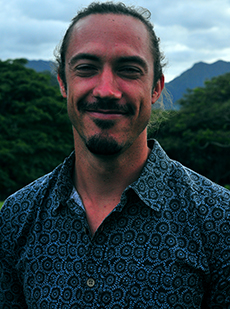Trevor Johannsen
 “The sea, once it casts its spell, holds one in its net of wonder forever.”- Jacques Cousteau
“The sea, once it casts its spell, holds one in its net of wonder forever.”- Jacques Cousteau
The ocean is an incredible thing. How can it be so beautiful, powerful, soothing, intimidating and fragile, all at once? Like many people, I love the ocean and can definitely be counted with those who are held in its net of wonder. Jacques Cousteau also said, “People protect what they love.” My broad interest and passion is in wildlife conservation and the ocean and all of its wonders needs our protection now more than ever.
For my Masters research, I am replicating a survey of the mushroom coral, Fungia scutaria, to find a long term trend in the population. Early data suggests that the population has increased significantly in the last 20 years, probably due to the decline of invasive algae. It has been a great project because I have been able to apply my experience in ecology, conservation, and resource management and it’s allowed me to spend lots of time under water, still in wonder of the sea.